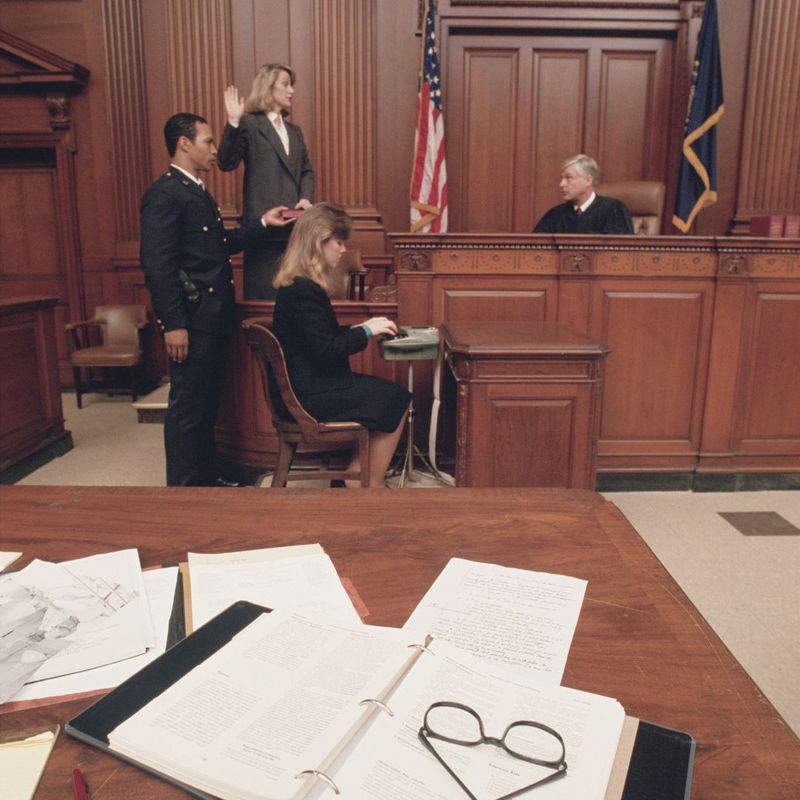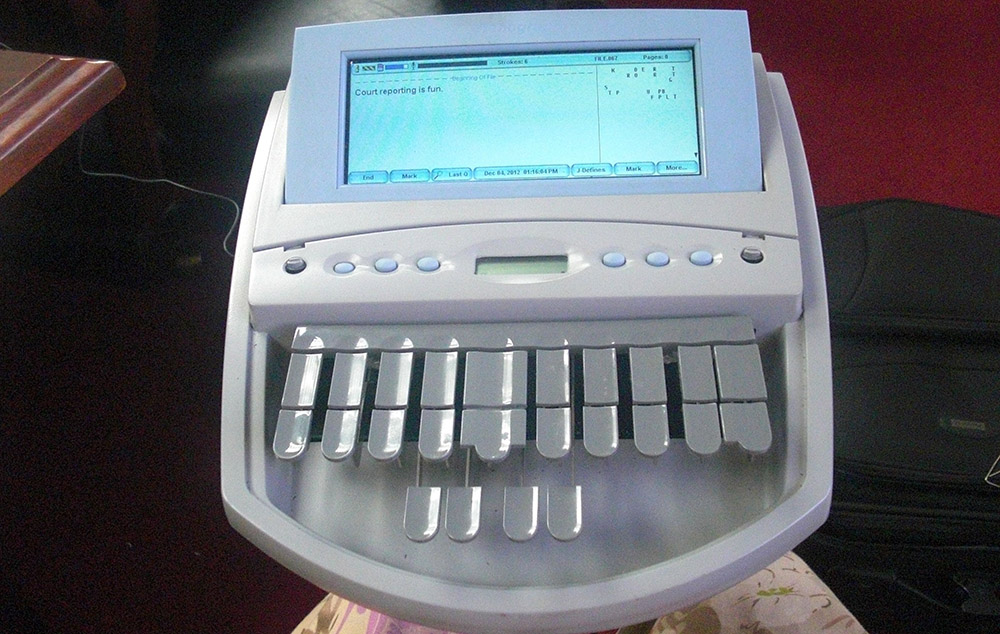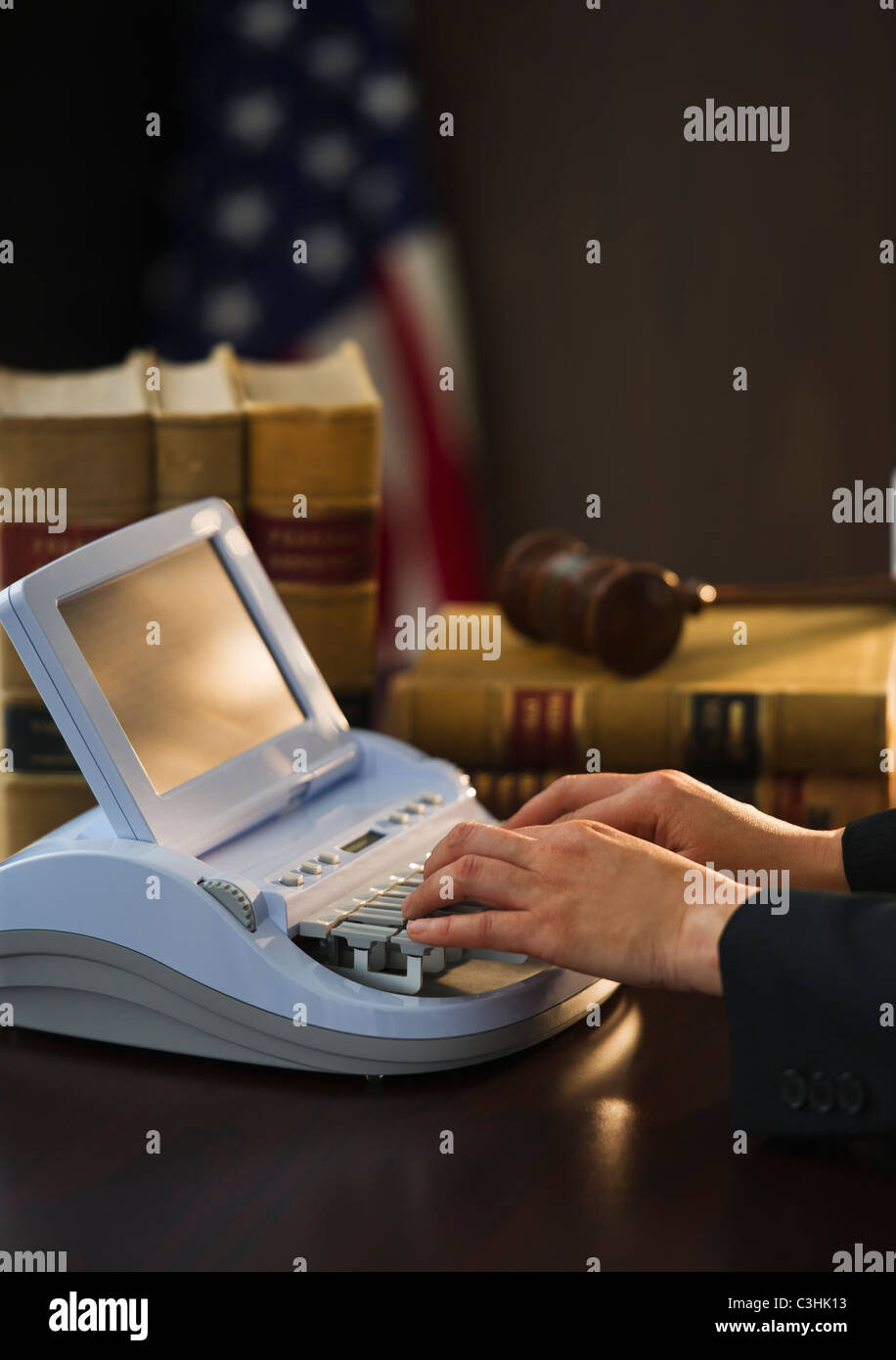Compensation Details and Career Outlook for a Court Typist
Compensation Details and Career Outlook for a Court Typist
Blog Article
Discover the Crucial Skills and Responsibilities of a Court Typist in Today's Lawful Landscape
As a court typist, you hold a vital position in the legal system. Your skills go beyond just keying; they entail understanding complex legal terms and procedures while guaranteeing precision in every paper. You work together very closely with judges and attorneys, making your role indispensable for effective communication. Yet what specific abilities do you require, and how can you adapt to the ever-evolving technical landscape? Let's discover this better.
The Role of a Court Typist in the Judicial System
As the foundation of the judicial system, a court typist plays a crucial duty in guaranteeing that lawful proceedings are accurately recorded. You are in charge of recording every little thing from witness testimonies to judges' rulings, catching every information with accuracy. Your work assists keep a clear and permanent record of court activities, which is crucial for future recommendation and appeals.In the courtroom, you're commonly the unsung hero, silently assuring that all talked words come to be created documents. You keep confidentiality, recognizing the delicate nature of legal matters. You likewise work together closely with judges, legal representatives, and clerks to guarantee the smooth flow of info. By functioning effectively under pressure, you contribute to the overall effectiveness of the judicial procedure. Your attention to detail and dedication to accuracy not only copyright the stability of the court yet likewise sustain the broader pursuit of justice in culture.
Necessary Skills Required for Court Typists
Court typists need an unique blend of abilities to master their crucial function within the judicial system. Firstly, you should have outstanding typing skills, commonly attaining speeds of 70 words per minute or more. Precision is important; even a small error can bring about significant misconceptions in lawful documents. You'll likewise need strong focus to information, making certain every word is transcribed correctly.Additionally, excellent organizational abilities are important for managing several cases and records effectively. Being tech-savvy is vital, as you'll use numerous software application for data processing and paper management. Solid interaction skills aid you communicate with courts, attorneys, and various other court workers effectively.Lastly, a feeling of professionalism and trust and privacy is a must, as you'll handle delicate info daily. By developing these skills, you'll be well-prepared to add considerably to the courtroom setting.
Recognizing Legal Terminology and Procedures
As a court typist, you require to realize key legal terms and procedures to execute your job efficiently. Comprehending these principles not only helps you record properly however additionally assures you can adhere to the circulation of court proceedings. Allow's check out the important lawful vocabulary and an overview of court processes you ought to understand.

Trick Legal Terms
Recognizing vital lawful terms is crucial for any individual functioning in a court atmosphere. You'll frequently encounter terms like "complainant," which describes the individual starting a suit, and "accused," that reacts to the claims. Knowing the distinction in between "civil" and "criminal" situations helps you realize the context of the procedures. Familiarity with "subpoena" guarantees you recognize the lawful files compelling witnesses to indicate. Furthermore, terms like "proof" and "statement" are crucial, as they associate straight to the information offered in court. Understanding these terms not only improves your performance as a court typist however likewise ensures that you contribute to the precision and clearness of legal files. Your role depends upon accurate terminology, so don't take it lightly!
Court Procedures Summary
Familiarity with key lawful terms establishes the stage for understanding court procedures. Understanding just how a courtroom features is vital for any court typist. You'll encounter procedures like arraignments, where defendants hear charges, and movements, which are demands for a court judgment. Acquaint yourself with the functions of judges, lawyers, and staffs, as each plays an important part in process. Recognizing the flow of a test-- from jury selection to closing arguments-- assists you precisely capture the procedures - court typist. In addition, recognizing the value of preserving a objective and accurate document can not be overemphasized. By grasping these aspects, you'll boost your effectiveness in documenting important court tasks and contribute considerably to the legal process. Your duty is important in maintaining the integrity of court records
The Effect of Technology on Court Entering
Technology's transformed court inputting in considerable ways. With digital transcription devices, you can enhance performance and precision, making your task simpler than ever before. Plus, remote court proceedings have changed just how you approach your job, calling for flexibility to brand-new formats and technologies.
Digital Transcription Tools
As digital transcription devices proceed to advance, they're changing the method court typists perform their tasks. These tools streamline the transcription process, permitting you to catch talked words accurately and successfully. With voice acknowledgment software application, you can record real-time proceedings, reducing hands-on input and lessening errors.Moreover, cloud-based platforms enable simple accessibility to documents, so you can function collaboratively with lawful groups and guarantee every person's on the same page. Automated format features save you time on repetitive jobs, letting you concentrate on material quality.Additionally, content digital tools enhance safety, shielding sensitive details with encrypted storage space and controlled accessibility. By accepting these innovations, you can improve your efficiency and preserve the high standards required in the lawful area.
Remote Court Procedures
The surge of remote court proceedings has actually significantly transformed the landscape for court typists. You now rely on technology to catch and transcribe online hearings from your office or home. Experience with video clip conferencing systems is essential, as you'll require to browse them flawlessly to ensure a precise document. You'll likewise have to handle audio high quality, as history sound or connection concerns can interrupt your work. Additionally, remote process demand quick thinking; you might need to make clear declarations or demand repeats in real-time. Remaining organized and effective is vital, as due dates stay limited. Accepting these technological improvements not just boosts your abilities yet also ensures you remain a very useful property in today's developing legal setting.
Accuracy and Interest to Detail in Transcription
Precision and focus to information are important in transcription, specifically for court typists. court typist. When you're recording lawful procedures, every word matters. A solitary error can modify the meaning of a declaration, potentially influencing the result of an instance. You need to listen meticulously, assuring that you record every nuance and inflection in the audio speaker's voice.Your capability to catch typos and grammatical mistakes is important. You do not simply type; you verify that the last record is a precise representation of what was claimed in court. This calls for an eager eye and a complete understanding of lawful terminology.Moreover, you'll need to be knowledgeable about different accents and speaking styles, as courts can organize a range of audio speakers. By sharpening your precision and attention to detail, you'll preserve the stability of lawful records and contribute substantially to the judicial procedure. Your persistance in this area really makes a distinction

Time Management and Business Abilities
While managing several tasks, effective time monitoring and business skills are essential for court typists. You'll usually manage numerous due dates, from recording court proceedings to preparing lawful papers. Prioritizing your work is important; determine immediate tasks and tackle them first to assure prompt submissions.Organizational abilities come into play when you're sorting through situation data, notes, and records. Keeping whatever neatly categorized not check my site only saves time however also minimizes the danger of error. Using devices like schedules, order of business, or specialized software can aid you stay on track and handle your time effectively.Moreover, establishing details goals for every work session can increase your efficiency. Break bigger tasks into smaller sized jobs to make them extra workable. By sharpening these abilities, you'll not just improve your efficiency however likewise contribute considerably to the smooth procedure of the lawful procedure, ensuring everything runs like clockwork.
Continuing Education And Learning and Professional Advancement Opportunities
Buying your abilities doesn't stop with time monitoring and organization. As a court typist, you'll find that proceeding education and learning and professional development are vital to remaining affordable in the legal area. Seek workshops or online courses concentrating on innovative typing techniques, lawful terms, and transcription software program. These can develop your skills and aid you adjust to the latest technologies.Networking is equally you can look here crucial. Sign up with professional companies like the National Court Reporters Organization (NCRA) or neighborhood legal organizations. They usually offer sources, training sessions, and conferences that can improve your understanding and attach you with peers.Don' t ignore qualification programs that can improve your trustworthiness and marketability. Staying updated with the most recent fads and ideal practices in lawful paperwork will certainly boost your efficiency and precision, making you a vital possession to any type of lawful group. Buy your development, and you'll gain the incentives throughout your occupation.
Frequently Asked Concerns
What Is the Normal Salary Array for a Court Typist?
A court typist's regular wage arrays from $30,000 to $55,000 yearly, depending on experience and place. You could also discover opportunities for development with extra abilities, resulting in increased pay in the legal field.

Are Court Typists Required to Have a Legal Level?
Court typists do not require a lawful degree, yet having one can be advantageous. You'll usually locate that solid typing abilities and knowledge of lawful terms are more crucial for success in this role.
What Are the Work Hours for a Court Typist?

Just How Do Court Typists Ensure Confidentiality in Their Job?
You assure privacy by securely dealing with sensitive files, using encrypted software, and following stringent procedures. You stay aware of personal privacy laws and only share info with licensed workers, preserving rely on the judicial procedure.
Can Court Typists Job From Another Location or Freelance?
Yes, you can function from another location or freelance as a court typist, specifically if you have dependable innovation and a protected setting. Numerous lawful specialists now welcome remote work, offering versatility and possibilities for independent typists. As the backbone of the judicial system, a court typist plays an essential role in guaranteeing that lawful process are properly documented. As a court typist, you require to realize essential legal terms and procedures to perform your job efficiently. Grasping these terms not just improves your performance as a court typist yet also ensures that you add to the precision and clarity of legal papers. The increase of remote court process has actually considerably altered the landscape for court typists. As a court typist, you'll find that continuing education and learning and expert development are important to remaining competitive in the legal field.
Report this page